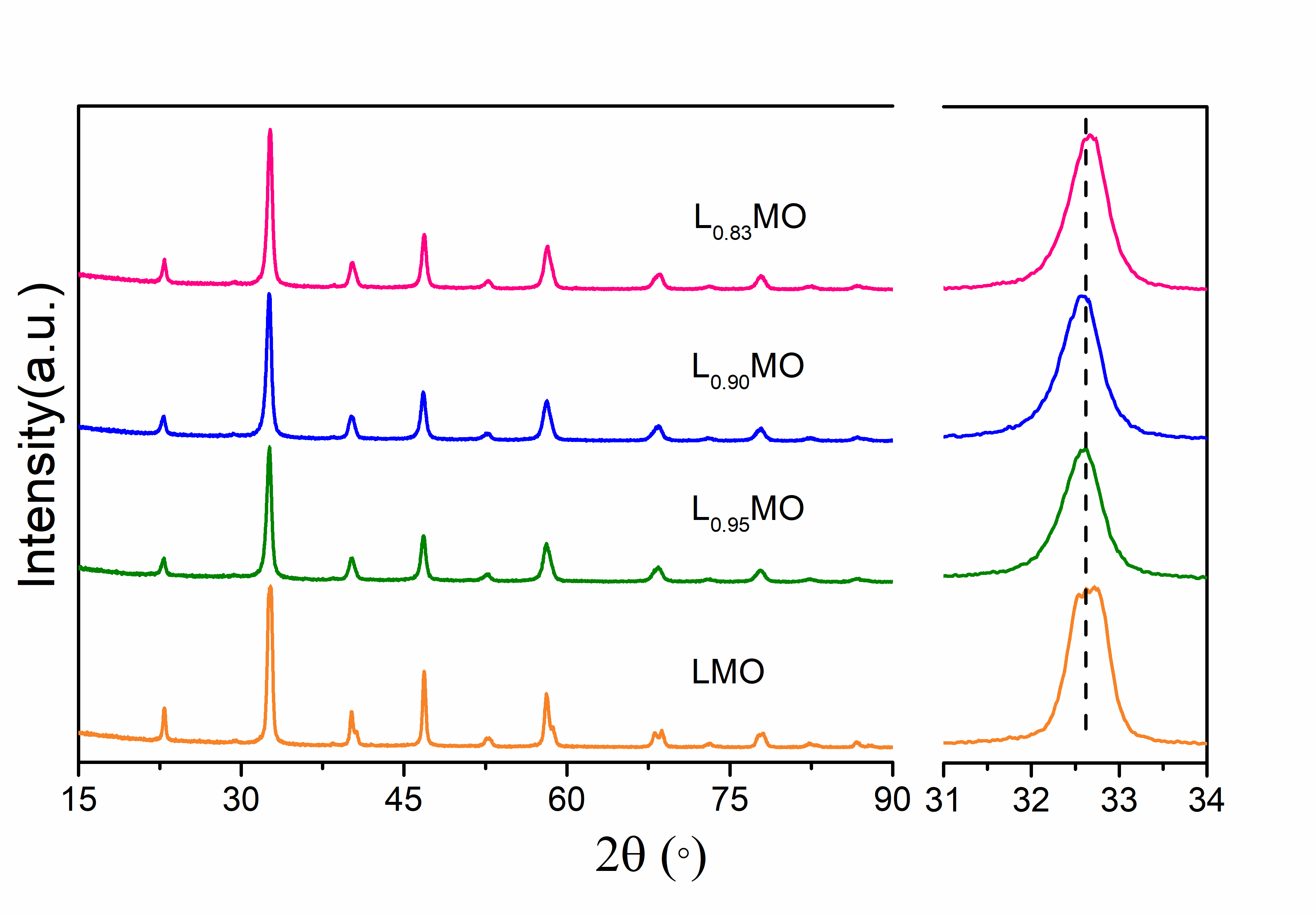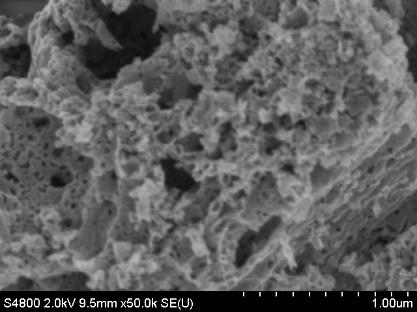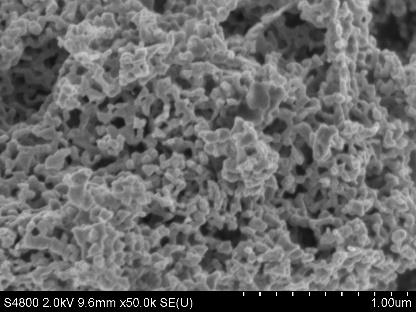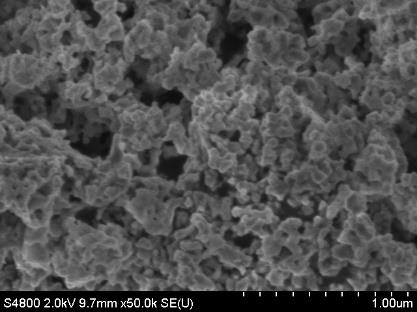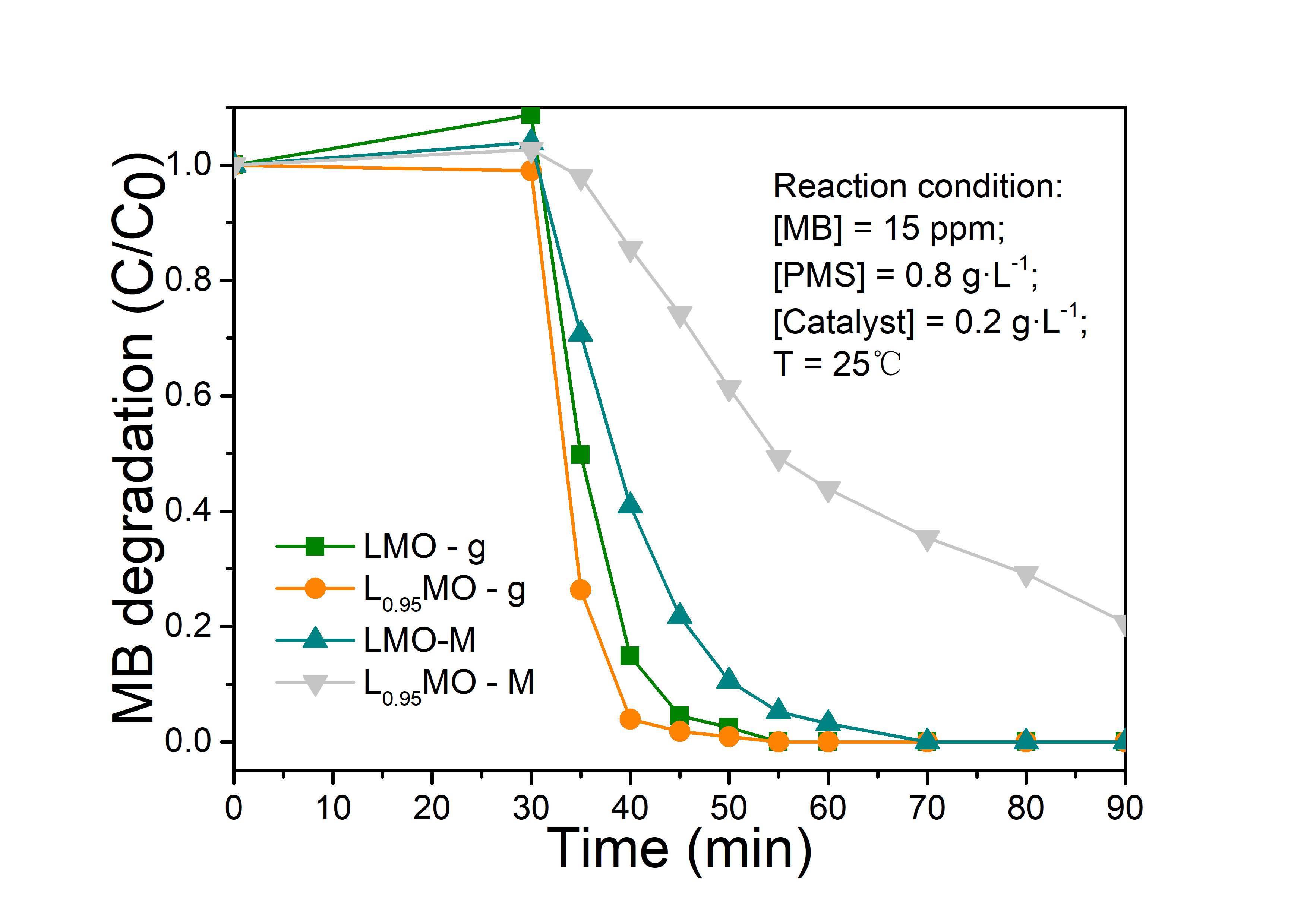A位缺陷及制备方法调控La1-xMnO3 δ在染料废水降解中的高级氧化催化性能及循环稳定性的研究毕业论文
2020-04-23 20:09:30
摘 要
随着“一带一路”的建设,我国的纺织产业在国家政策支持下飞速发展,而生产过程中染料类污水造成的污染问题也日益严重,尤其是部分污染物具有致癌性,严重威胁人类健康和生态系统。
不同于传统工艺复杂、设备繁多的污水处理技术,高级氧化技术作为一种新兴的绿色技术,因其反应过程环保无害且效率高,逐渐成为研究的主流方向。本文基于硫酸根自由基的高级氧化技术(AOPs),采用过氧一硫酸盐(PMS)降解含有罗丹明B(MB)的有机污染废水,研究钙钛矿型金属氧化物La1-xMnO3 δ (x= 0, 0.05)的表征、催化性能、稳定性及不同制备方法对材料降解性能的影响。实验中,通过XRD、SEM等表征确定了该催化剂的自身结构特征,且降解效率良好;并确定了由甘氨酸法制备的LaMnO3体系催化剂的催化性能优于溶胶-凝胶法制备的催化剂,且经过一次循环后,催化剂的性能有所改善。此外,本文还研究了循环前后催化剂性能提升的原因,以证实该体系是否具有实际应用价值。同时,测试了自来水、河水分别作为水基质的有机污染废水降解效率,发现微量共存阴离子存在影响降解快慢的趋势。
关键词:高级氧化技术 钙钛矿型金属氧化物 过氧一硫酸盐 有机污染废水
Study on Cyclic Stability and Effect of Different Preparation Method on Advanced Oxidation Performance of Dye Wastewater Catalyzed by La1-xMnO3 δ (x= 0, 0.05)
Abstract
With the construction of the “Belt and Road”, China's textile industry is developing rapidly under the support of national policies, and the pollution caused by dye wastewater in the production process is becoming more and more serious, especially some pollutants are carcinogenic and seriously threaten human health and ecosystem.
Different from traditional wastewater treatment technology with complex processes and various equipment, advanced oxidation technology, as an emerging green technology, has gradually become the mainstream of research because its reaction process is environmentally friendly and efficient. In the system of sulfate radicals based AOPs , the peroxidic monosulfate (PMS) was used as superoxide to degrade the organic contaminated wastewater containing MB. Perovskite-type metal oxide La1-xMnO3 δ (x= 0, 0.05) was chosen as the catalyst, and the effects of different preparation methods on its characterization, degradation performance and stability were studied. In the experiment, the structure of the catalyst was determined by BET, XRD, etc. and the degradation efficiency was good. The LaMnO3 system catalyst prepared by the glycine method showed superior catalytic performance than that prepared by the sol-gel method. The catalyst exhibited improved performance after one cycle. In addition, the reasons for the improvement of catalyst performance before and after the cycle were also studied to confirm that the system does have a good degradation effect on the actual wastewater. At the same time, the degradation efficiency of organic dissolve in running water and water from river was tested,and the effect of anions in aqueous solution on degradation rate was found.
Keywords: Advanced oxidation technology; Permonosulphate; Perovskite; Organic wastewater
目录
摘 要 I
Abstract II
第一章 绪论 1
1.1染料废水 1
1.1.1成因 1
1.1.2治理现状 1
1.2污水处理方法 1
1.2.1利用物理特性的技术 1
1.2.2 利用化学性质的技术 2
1.3高级氧化技术(AOPs) 3
1.3.1AOPs基于羟基自由基的概述 3
1.3.2AOPs基于硫酸根自由基的概述 4
1.4材料制备方法 4
1.4.1甘氨酸法 4
1.4.2溶胶-凝胶法 5
1.5研究背景 5
1.5.1 PMS研究现状 5
1.5.2硫酸根自由基的产生 6
1.5.3硫酸根自由基的应用 6
1.5.4钙钛矿简介 7
第二章 实验部分 9
2.1实验仪器与药品 9
2.1.1实验仪器 9
2.1.2实验药品 9
2.2催化剂的制备 10
2.2.1甘氨酸法制备催化剂 10
2.2.2溶胶-凝胶法制备催化剂 10
2.3材料研究与测试 11
2.3.1 X射线衍射(XRD) 11
2.3.2扫描电子显微镜(SEM) 12
2.3.3 BET法测定比表面 12
2.4催化剂的性能测试 12
2.4.1降解反应 12
2.4.2稳定性测试 12
2.4.3捕获测试 13
第三章 实验结果与讨论 14
3.1催化剂的表征 14
3.1.1 XRD图谱分析 14
3.1.2 SEM形貌分析 15
3.1.3 BET形貌分析 15
3.2 催化剂性能研究 16
3.2.1降解效率分析 16
3.2.2稳定性分析 18
3.2.3捕获实验分析 20
3.2.4水体特性分析 22
3.2.5不同水体测试分析 23
第四章 结论与展望 24
4.1结论 24
4.2展望 24
参考文献 25
致谢 28
第一章 绪论
1.1染料废水
1.1.1成因
染料废水来源于生产过程中对各类纺织材料(纤维、纱线、织品等)进行物化处理的印染工艺过程,其中包括对纺织材料的前处理、染色、印花和后整理过程。这种废水会影响水生生物的光合作用,因为光穿透减少,而且还会引起人类严重的健康问题。而随着2018年1月1日《中华人民共和国环境保护税法》的正式实施,使得这一问题的解决迫在眉睫。
1.1.2治理现状
处理染料废水的主要问题是去除COD,特别是降低其色度。然而,由于染料分子的稳定性,这种废水通常难以处理。它们中的大多数是具有各种芳香烃的复杂有机化合物。处理这些废水的方法包括物理吸附、化学氧化、生物降解、离子交换和膜过滤等。然而,这些方法大多数是实验室规模的,投入昂贵又不够成熟。在工业中,常用Cl和NaOCl脱色,但会形成有害的副产物氯苯胺、氯酚和氯硝基苯。到目前为止,找到一种有效且低成本的技术解决方案,并处理染料废水且满足严格的环境法规对于工业生产来说仍然是一个巨大的挑战。
1.2污水处理方法
1.2.1利用物理特性的技术
相关图片展示:
